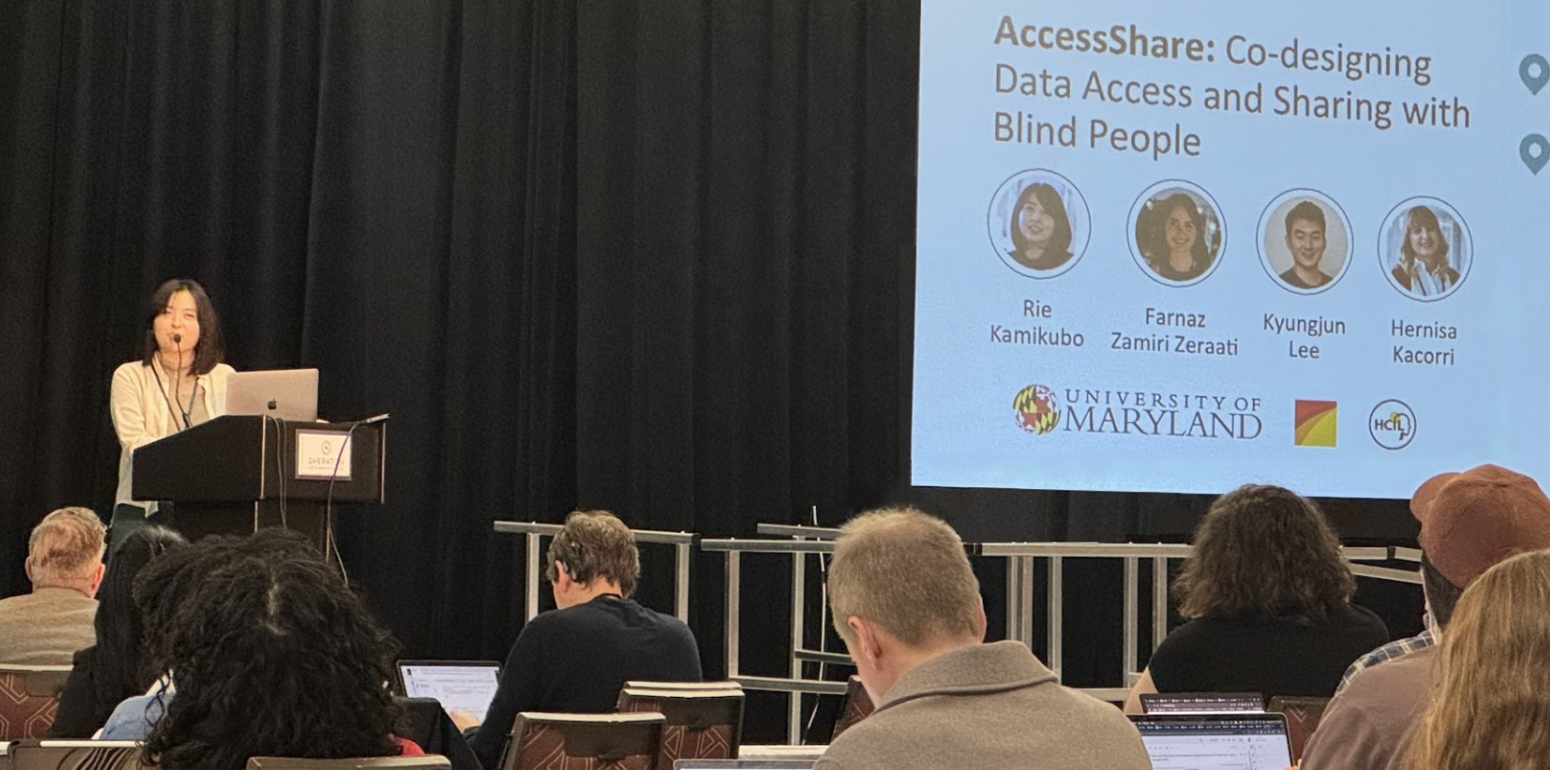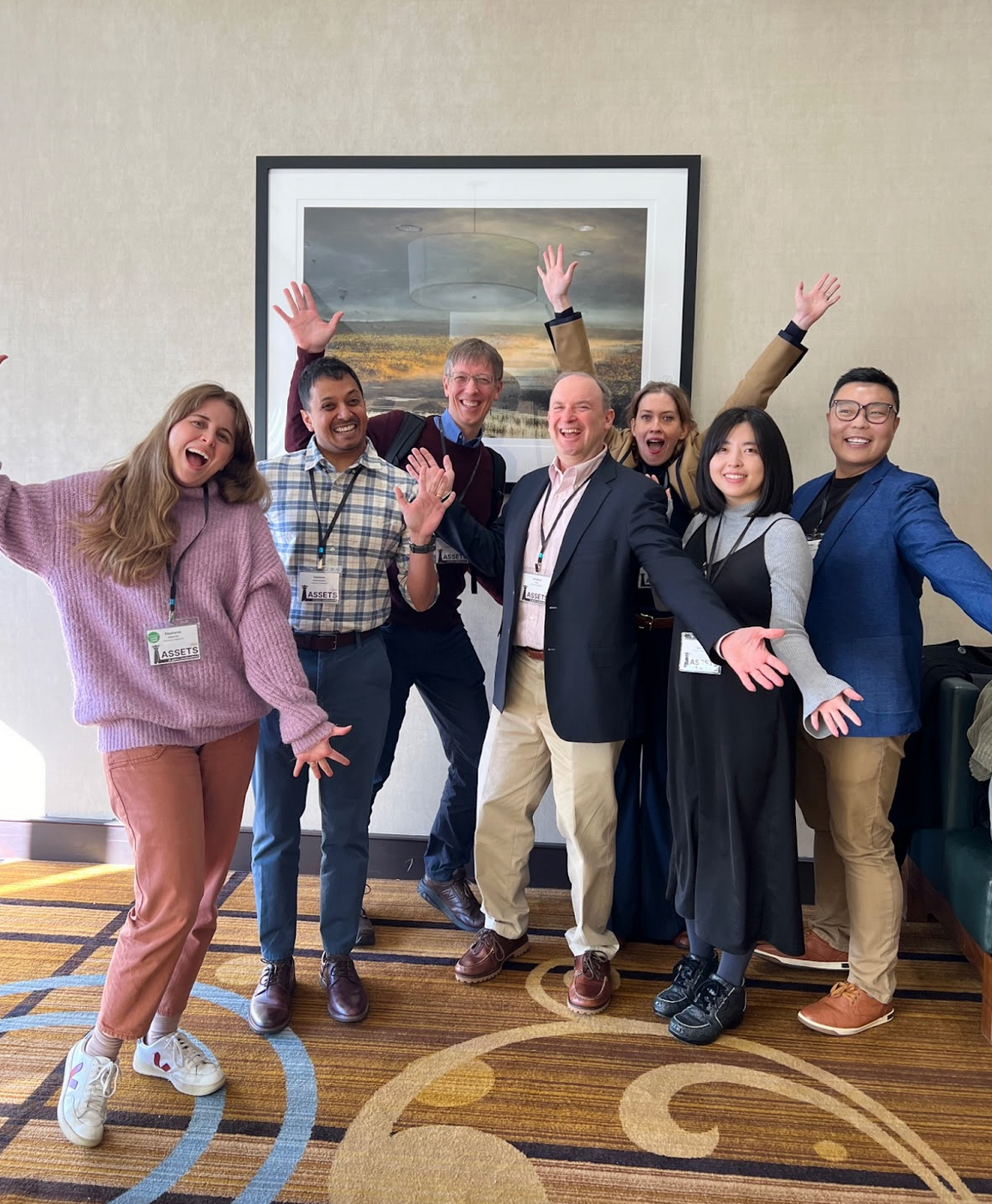Researchers from the University of Maryland (UMD) Maryland Institute for Digital Accessibility (MIDA) presented at the 26th International ACM SIGACCESS Conference on Computers and Accessibility (ASSETS), which was held October 28-30, 2024 in St. John’s, Newfoundland and Labrador, Canada. The ASSETS conference is the leading platform for presenting research on computing design, evaluation, use, and education for people with disabilities and older adults.

MIDA, supported by a University of Maryland Grand Challenges Grant and directed by UMD College of Information Professor Jonathan Lazar, aims to make technology accessible and help make the world more inclusive of and for people with disabilities.
MIDA has a long history of service and involvement in the ASSETS organizing committee, making MIDA members intrinsic to the mission of the conference. MIDA researchers engaged in the leadership of the ASSETS conference in the following roles:
- J. Bern Jordan: 2021 and 2022 accessibility co-chair
- Hernisa Kacorri: 2023 mentor for the doctoral consortium; 2020 registration chair/treasurer; 2018 student research competition co-chair; and 2016 student competition judge
- Rie Kamikubo: 2022 student volunteer
- Jonathan Lazar: 2021-2024 ASSETS Steering Committee Member; 2021 general chair; 2020 doctoral consortium co-chair
- Stephanie Valencia2: 2024 program committee member and co-chair of the student research competition; 2020 publicity co-chair
- Rachel Wood: 2021 web design co-chair
ASSETS presentations by MIDA researchers at the ASSETS 2024 conference include:
(UMD/MIDA researchers are in italics)
AccessShare: Co-designing Data Access and Sharing with Blind People
Rie Kamikubo, Farnaz Zamiri Zeraati, Kyungjun Lee, Hernisa Kacorri
In this technical paper, the authors engage blind participants in a real-world data stewardship process, from collecting image data in their homes using an AI-infused application to sharing them via a public AI dataset. Within this process, the authors engineered a novel data access interface called AccessShare and conducted a co-design study to discuss participants' needs and preferences for consent, data inspection, and control.
Exploring Videoconferencing for Older Adults with Cognitive Concerns Using a Dramaturgical Lens
Ruipu Hu, Ge Gao, Amanda Lazar
This work explores videoconferencing use among older adults with cognitive concerns through a dramaturgical lens, identifying how participants’ 'performances and roles,' 'backstage' setups and preparatory work, and 'frontstage' impression management shape their technology experiences, offering insights for accessible HCI design.
Rachel Wood, Jinjuan Feng, Jonathan Lazar
As health data spreads across various devices and systems that use visualizations to simplify complex information, it’s essential to understand how people with limited graphicacy (i.e., health data literacy) skills process these visualizations in order to make informed decisions about their behavior, health, and ability to self-advocate. The TACCESS journal article by Wood, Feng, and Lazar, was one of a handful high-quality TACCESS papers invited to present at ASSETS. The article provides, for the first time, detailed preliminary data on how people with Down Syndrome read and make sense of data visualizations in a digital health context, the barriers they encounter, and suggest accessibility improvements.
Help and The Social Construction of Access: A Case-Study from India
Vaishnav Kameswaran, Jerry Robinson, Nithya Sambasivan, Gaurav Aggarwal, Meredith Ringel Morris
This work explores the socio-cultural dimensions of help through the lens of people with visual impairments in India. Through semi-structured interviews and a video-diary study, the research finds that seeking help, rather than ‘independence’ i.e. accomplishing tasks without the same help was the norm for study participants. Help was critical in facilitating access and shared cultural values between recipients and providers created a common ground for accepting help. The authors also unpack the implications of their findings for the design of future accessible technologies, including AI.
J. Bern Jordan, Victoria Van Hyning, Mason A. Jones, Rachael Bradley Montgomery, Elizabeth Bottner, Evan Tansil
This short paper is in experience report format, where the authors reflect on the wide variation of how themselves and others approach using and navigating web pages with screen reader technology. To potentially help others with research and development in this area, they distilled their experiences and observations into five personas. Bern Jordan said “Many attendees approached afterwards and felt they had a new appreciation of the complexity of screen readers and the wide variations in how blind people use those tools.”
Understanding How Blind Users Handle Object Recognition Errors: Strategies and Challenges
Jonggi Hong, Hernisa Kacorri
This technical paper presents a study aimed at understanding blind users’ interaction with object recognition systems for identifying and avoiding errors. Leveraging a pre-existing object recognition system, URCam, fine-tuned for our experiment, the authors conducted a user study involving 12 blind and low-vision participants. Through in-depth interviews and hands-on error identification tasks, the authors gained insights into users’ experiences, challenges, and strategies for identifying errors in camera-based assistive technologies and object recognition systems.
Understanding the Visualization and Analytics Needs of Blind and Low-Vision Professionals
Pramod Chundury, Urja Thakkar, Yasmin Reyazuddin, J. Bern Jordan, Niklas Elmqvist, Jonathan Lazar
This work explores the unique challenges and strategies Blind and Low-Vision (BLV) face in data analysis. The authors used a two-step survey approach, focusing on real-world experiences of BLV professionals across diverse roles in data analysis, from programming to visualization tasks. Despite BLV professionals’ expertise in tools like Python and Excel, accessibility gaps remain throughout the data analysis process - impacting data loading, visualization creation and overall independence. Collaboration is common but often due to necessity, and not choice. Finally, the study also highlights the importance of tactile, auditory and screen reader-compatible data representations, as well as better design principles to enhance data access for BLV users.
PhD students shared their experiences about the conference: “The ASSETS community is growing, and I’m thrilled to be a part of it. St. John's was a stunning location—what a seafood delight!,” says PhD student Rie Kamikubo. PhD

candidate Rachel Wood said: “I’ve only virtually attended ASSETS before. Having an entire conference dedicated to and filled with smart, kind people, who are passionate about the same things you are, made my heart so happy. I’ve already set up a meeting with a few other researchers I never would have met otherwise to propose a future workshop together!” PhD student Ruipu Hu shares that “presenting in person at [his] first ASSETS conference and connecting with so many like-minded individuals dedicated to accessibility research was a truly meaningful experience.” And post-doc Vaishnav Kameswaran said: “It was super fun to be a part of my first ASSETS conference. I had a great time connecting with accessibility researchers and gathering new ideas”
Over the past two years, researchers from the College of Information, College of Computer, Mathematical and Natural Sciences, College of Education, School of Public Health, College of Arts and Humanities, College of Behavioral and Social Sciences, A. James Clark School of Engineering, Division of Information Technology, University Libraries, and University Career Center have worked on changing technology design to involve the disability rights community from inception, making it “born-accessible.”
One key focus of MIDA faculty and students is on research and development projects attempting to develop methods and tools for the born-accessible approach and to apply born-accessible concepts, with Adobe and the US Access Board, respectively. MIDA Director Jonathan Lazar, MIDA Associate Director J. Bern Jordan, MIDA Affiliate Faculty Professor Jinjuan Heidi Feng, and PhD student Rachel Wood are involved with the Access Board project. MIDA Director Jonathan Lazar and PhD student Abhinav Kannan are involved with the Adobe project.
To learn more about MIDA, visit: mida.umd.edu
